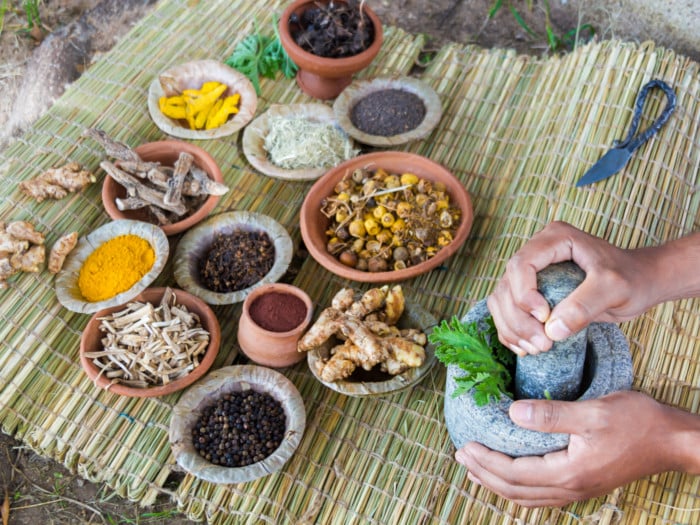The practice of Ayurvedic medicine dates back for at least two thousand years and remains an important and viable treatment approach for many common health conditions.
What is Ayurvedic Medicine?
Ayurvedic medicine is a traditional style of healing medicine that has its origins in the Indian subcontinent. Generally speaking, Ayurvedic medicine is based on manipulating and understanding the energetic forces in nature – the doshas – more specifically known as the Vata dosha, Pitta dosha, and Kapha dosha. By balancing these different forces, and maintaining our energetic unity with nature, we can come into unity with ourselves, and our true spirit. When all of these forces and energetic flows in the body are optimized, it also leads to better health. [1]
While this is part of the philosophy behind this medicinal practice, many of the common herbs and treatments that are included in this practice have also been scientifically studied and verified. Thousands of years ago, Ayurvedic medicine was as effective as it can be today, but now practitioners are equipped with knowledge of the science and active ingredients behind so many of these natural remedies. [2]

A Hindu god named Dhanvantari is connected to Ayurveda. Photo Credit: Shutterstock
One can be diagnosed in eight different ways within the Ayurvedic practice – by your pulse, stool, urine, tongue, appearance, touch, vision or speech. Once a diagnosis is made, treatment can take many forms, ranging from massage, yoga, and meditation to the consumption of plant-based tinctures, alcoholic beverages, and unique herbal preparations.
Ayurvedic Medicine Benefits
Benefits of Ayurvedic medicine include its ability to lower stress & anxiety, and blood pressure, increase circulation, reduce inflammation, aid in weight loss, and regulate diabetes.
Let us look at some of the important conditions known to be treated by Ayurvedic medicine:
Stress and Anxiety
As mentioned, meditation is an important part of Ayurvedic treatment, and it has proven to help balance hormone levels and prevent excess stress and anxiety levels. [3]
Blood Pressure
There are many different herbs and foods that can be used to lower blood pressure. Cardamom, ashwagandha, and gotu kola, as well as honey and garlic, are all widely used in this type of natural treatment, as are meditation and massage techniques. This can help lower stress hormones and inflammation, which can reduce blood pressure and protect the heart. [4]
Injury or Illness Recovery
Rubbing the skin with certain essential oils is a key massage practice in Ayurveda, as it known to increase circulation and reduce inflammation. Furthermore, herbs like holy basil and ashwagandha can be prescribed for oral or topical use to improve healing speed and reduce the appearance of scars. [5]
Weight Loss
One of the three doshas relates to your metabolic activities, which can be affected by countless different variables every day. When it comes to weight loss in Ayurveda, a combination of an Ayurvedic diet, stress relief, and some essential oils can help prevent overeating, boost the metabolism and aid in your body’s natural weight loss abilities. [6]
Hormonal Balance
Maca, suma, ashwagandha, and avena sativa are used in Ayurvedic treatments to regulate your thyroid and minimize hormone-related symptoms in your body. [7]
Diabetes
Many Ayurvedic treatments relate to the regulation of the metabolism, and bodily processes, like digestion, nutrient absorption and the release of hormones. Therefore, when it comes to treating diabetes, using things like fenugreek, holy basil seed, and jambolan seed can make a major difference.
